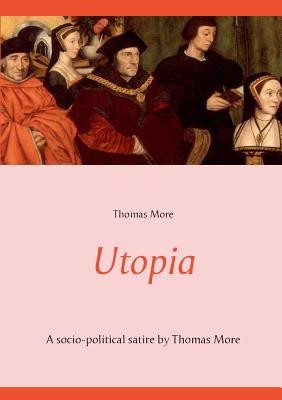
- We will send in 10–14 business days.
- Author: Thomas More
- Publisher: Books on Demand
- ISBN-10: 2322134228
- ISBN-13: 9782322134229
- Format: 14.8 x 21 x 0.7 cm, minkšti viršeliai
- Language: English
- SAVE -10% with code: EXTRA
Reviews
Description
Utopia (Libellus vere aureus, nec minus salutaris quam festivus, de optimo rei publicae statu deque nova insula Utopia) is a work of fiction and socio-political satire by Thomas More (1478-1535) published in 1516 in Latin. The book is a frame narrative primarily depicting a fictional island society and its religious, social and political customs. Many aspects of More's description of Utopia are reminiscent of life in monasteries. Utopia was begun while More was an envoy in the Low Countries in May 1515. More started by writing the introduction and the description of the society which would become the second half of the work and on his return to England he wrote the "dialogue of counsel", completing the work in 1516. In the same year, it was printed in Leuven under Erasmus's editorship and after revisions by More it was printed in Basel in November 1518. It was not until 1551, sixteen years after More's execution, that it was first published in England as an English translation by Ralph Robinson. Gilbert Burnet's translation of 1684 is probably the most commonly cited version. The work seems to have been popular, if misunderstood: the introduction of More's Epigrams of 1518 mentions a man who did not regard More as a good writer. The eponymous title Utopia has since eclipsed More's original story and the term is now commonly used to describe an idyllic, imaginary society. Although he may not have directly founded the contemporary notion of what has since become known as Utopian and dystopian fiction, More certainly popularised the idea of imagined parallel realities, and some of the early works which owe a debt to Utopia must include The City of the Sun by Tommaso Campanella, Description of the Republic of Christianopolis by Johannes Valentinus Andreae, New Atlantis by Francis Bacon and Candide by Voltaire. The politics of Utopia have been seen as influential to the ideas of Anabaptism and communism.[citation needed] While utopian socialism was used to describe th
EXTRA 10 % discount with code: EXTRA
The promotion ends in 23d.08:27:36
The discount code is valid when purchasing from 10 €. Discounts do not stack.
- Author: Thomas More
- Publisher: Books on Demand
- ISBN-10: 2322134228
- ISBN-13: 9782322134229
- Format: 14.8 x 21 x 0.7 cm, minkšti viršeliai
- Language: English English
Utopia (Libellus vere aureus, nec minus salutaris quam festivus, de optimo rei publicae statu deque nova insula Utopia) is a work of fiction and socio-political satire by Thomas More (1478-1535) published in 1516 in Latin. The book is a frame narrative primarily depicting a fictional island society and its religious, social and political customs. Many aspects of More's description of Utopia are reminiscent of life in monasteries. Utopia was begun while More was an envoy in the Low Countries in May 1515. More started by writing the introduction and the description of the society which would become the second half of the work and on his return to England he wrote the "dialogue of counsel", completing the work in 1516. In the same year, it was printed in Leuven under Erasmus's editorship and after revisions by More it was printed in Basel in November 1518. It was not until 1551, sixteen years after More's execution, that it was first published in England as an English translation by Ralph Robinson. Gilbert Burnet's translation of 1684 is probably the most commonly cited version. The work seems to have been popular, if misunderstood: the introduction of More's Epigrams of 1518 mentions a man who did not regard More as a good writer. The eponymous title Utopia has since eclipsed More's original story and the term is now commonly used to describe an idyllic, imaginary society. Although he may not have directly founded the contemporary notion of what has since become known as Utopian and dystopian fiction, More certainly popularised the idea of imagined parallel realities, and some of the early works which owe a debt to Utopia must include The City of the Sun by Tommaso Campanella, Description of the Republic of Christianopolis by Johannes Valentinus Andreae, New Atlantis by Francis Bacon and Candide by Voltaire. The politics of Utopia have been seen as influential to the ideas of Anabaptism and communism.[citation needed] While utopian socialism was used to describe th


Reviews